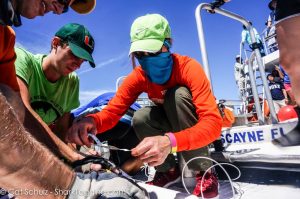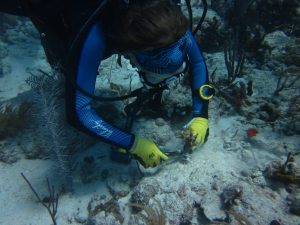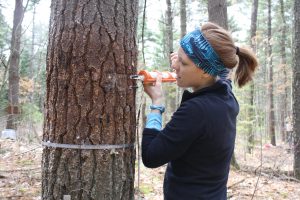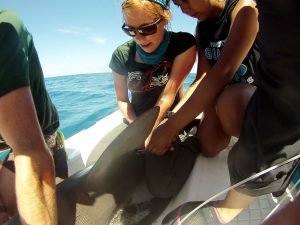Meet Our Team: Rachel Skubel
1. What’s your role in the lab?
I’m a shark research intern, which means that I am working with the team on our shark tagging expeditions, helping to carry out research projects, and working on some outreach initiatives as well. One of the experiments we are beginning now is testing the impact of shark presence on coral health. We’re able to do this by using a model plastic shark placed next to a block of growing corals, and observing fish behavior and coral over time. When sharks are reduced on a reef (by overfishing, for example), the population of fish that they feed on will grow, and then the numbers of fish that those species eat will decline. These fish are commonly herbivores that consume harmful algae growing upon corals, so the end result of shark declines can be coral disease, slower growth, and mortality. Since fish abundance can be affected by the mere presence of a shark – which is not even feeding – we can try to demonstrate this ‘trophic cascade’ experimentally.

2. Tell us a little about yourself.
I’m originally from London, Ontario in Canada, a few hours outside of the better-known Toronto. My undergrad was from Western University (in London), and my Masters of Science was done at McMaster University (in Hamilton). Two months ago, I made the move down to Miami to work with the RJ Dunlap shark research group. Outside of shark science, I love riding my road bike and spending time in the ocean, whether it be swimming or SCUBA diving. Right now I’m also getting into photography – there’s an endless supply of natural beauty around South Florida.
3. How did you get interested in marine biology and conservation?
Growing up around the Great Lakes, the oceans always harbored endless mystery and fascination for me, and the more I learned, the more I wanted to spend my life exploring and protecting them. Although my undergrad and Masters were in Environmental Science, particularly climate science and forest ecology, marine conservation was always the end goal. Sometime during my M.Sc., as I was exploring different marine science fields, I realized that you could actually work with and study sharks as a job. Right then and there I knew that there was no other path for me.
4. What’s your favorite part about working in the lab?
This is a hard one! Being able to be involved in so many research projects, from urban shark tagging to testing blood plasma samples for triglycerides, is a very unique opportunity. Getting my hands into so many different aspects of shark science has really helped me to grow as a researcher. The communication and media work that we do here is also quite exciting, as it’s one thing to conduct our research and another entirely to translate the results into tangible changes in management, policy, and public perceptions of sharks. And of course, working with school groups on our trips, sharing this exciting work with younger students and giving them a snapshot of what marine scientists can do, is always a blast.
5. Is there anything else you’d like to say to our blog readers?
It’s difficult to describe the sensation of being close to the formidable animals we’re so lucky to work with, but one important aspect is experiencing these ‘fish out of water’ moments. In the ocean, undisturbed by human activities, these sharks are ideally adapted to their roles in ecosystems around the world. When we’re working them up, you realize how vulnerable they really can be if they’re out of their element. With overfishing, ocean pollution, and climate change, we are presenting sharks with a huge host of challenges, and certainly changing their ‘element’ so to speak. Although we know that there can be huge ramifications, like their hunting and feeding being less successful with ocean acidification, there is still so much more to learn. It’s important to realize that, while sharks have this reputation of being perfectly attuned predators, they are actually quite capable of falling prey to human-induced stresses.







Leave a Reply
Want to join the discussion?Feel free to contribute!